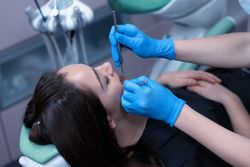
Although piercing your tongue, lips, or cheek is a popular trend these days, it comes with some health risks. After all, the mouth is a sensitive area where the slightest negative effect can quickly be compounded. If you’re considering getting an oral piercing, or already have one, it’s important to know how it could impact your dental health and future visits to the dentist.
How Oral Piercings Affect Dental Health
1. Allergic Reactions
The skin in your mouth may not react well to the metal in the piercing. No matter whether you put it in your tongue, lip, or cheek, the site may turn bright red and become a rash. Dermatitis could develop around the piercing, too, and there’s a possibility that it will start leaking a yellowish pus. If you still want the piercing, watch for any sign of an allergic reaction, and if you see one, get the piercing removed as soon as possible.
2. Infections
 As skin openings filled with foreign objects, oral piercings are prone to infection. Your cheek, tongue, or lips--which are at an especially high risk due to their regular contact with foods and liquids--may become reddish. All these sites could swell, but the tongue could get large enough to block your airway. Furthermore, severe infections could release an odorous pus. Prevent infections by regularly cleaning the site with saline solution, but if you contract one anyway, visit a doctor or dentist right away to be treated.
As skin openings filled with foreign objects, oral piercings are prone to infection. Your cheek, tongue, or lips--which are at an especially high risk due to their regular contact with foods and liquids--may become reddish. All these sites could swell, but the tongue could get large enough to block your airway. Furthermore, severe infections could release an odorous pus. Prevent infections by regularly cleaning the site with saline solution, but if you contract one anyway, visit a doctor or dentist right away to be treated.
3. Trouble With Normal Mouth Functions
Your tongue and lips may be hindered by the piercing when you’re trying to form words. Also, food can get caught in the piercings, or you may even accidentally bite on them while you’re trying to chew. Tongue piercings are known for causing the mouth to generate more saliva than usual, meaning you’d struggle with drooling. If you can get used to being more careful and specific with the way you move your mouth, you can still keep the piercing.
4. Damaged Teeth, Gums, & Nerves
The act of piercing your cheek, tongue, or lips will make the site numb for a while, but there’s a chance that permanent nerve damage could occur. Even if it doesn’t, the metal piercing is hard on your teeth and gums. You could easily crack a tooth, damage a filling, or cut your gums. It’s imperative to see a dentist right away if any of these things happen, but keep in mind that the piercing could hinder X-raying.
The team of dentists at Avon Dental Care in Lorain County, OH, is dedicated to your dental health regardless of whether you choose to get oral piercings. In addition, they offer services in cosmetic dentistry--including dental implants and teeth whitening--and general dentistry. For over 20 years, they have committed themselves to forging lifelong and personal customer relationships. Call them at (440) 937-2273 or visit them online to make an appointment.
About the Business
Have a question? Ask the experts!
Send your question

